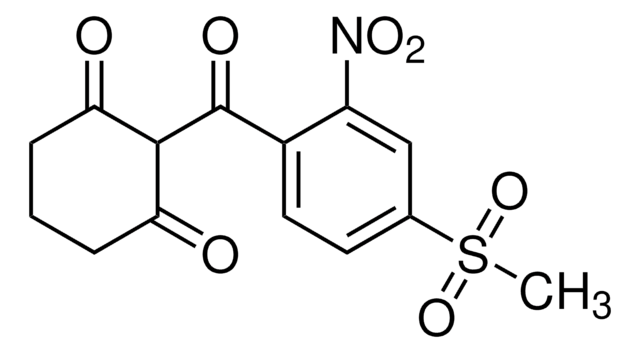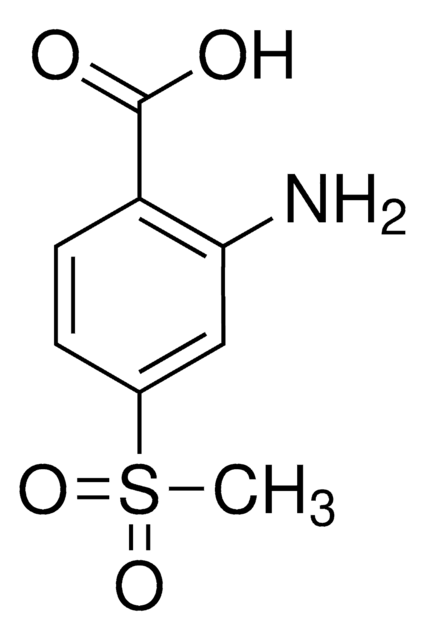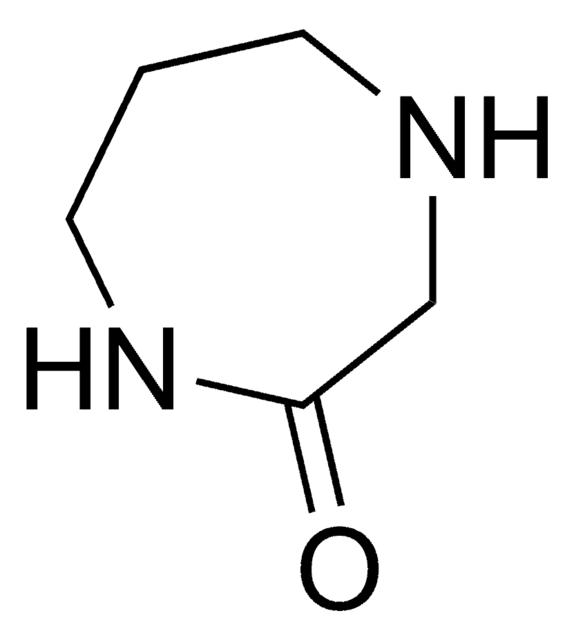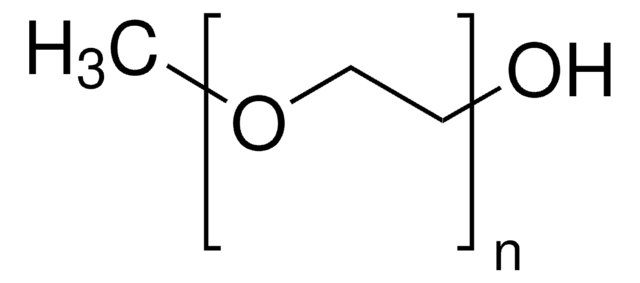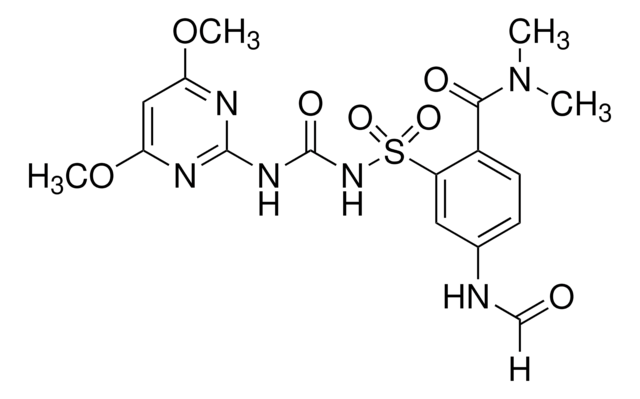CRM18124
Mesotrion Metabolite AMBA
certified reference material, TraceCERT®, Manufactured by: Sigma-Aldrich Production GmbH, Switzerland
동의어(들):
2-Amino-4-(methylsulfonyl)benzoic acid
로그인조직 및 계약 가격 보기
모든 사진(1)
About This Item
실험식(Hill 표기법):
C8H9NO4S
CAS Number:
Molecular Weight:
215.23
MDL number:
UNSPSC 코드:
41116107
NACRES:
NA.24
추천 제품
Grade
certified reference material
Quality Level
제품 라인
TraceCERT®
grade
TraceCERT®
유통기한
limited shelf life, expiry date on the label
제조업체/상표
Manufactured by: Sigma-Aldrich Production GmbH, Switzerland
형식
neat
저장 온도
−20°C
SMILES string
[S](=O)(=O)(C)c1cc(c(cc1)C(=O)O)N
InChI
1S/C8H9NO4S/c1-14(12,13)5-2-3-6(8(10)11)7(9)4-5/h2-4H,9H2,1H3,(H,10,11)
InChI key
KFOGGDGNOLZBNY-UHFFFAOYSA-N
유사한 제품을 찾으십니까? 방문 제품 비교 안내
일반 설명
This certified reference material (CRM) is produced and certified in accordance with ISO/IEC 17025 and ISO 17034. This CRM is traceable to primary material from an NMI, e.g. NIST or NMIJ.
Certified content by quantitative NMR incl. uncertainty and expiry date are given on the certificate.
Download your certificate at: http://www.sigma-aldrich.com
AMBA (2-amino-4-methylsulfonylbenzoic acid) is one of the metabolites formed from biodegradation of parent Mesotrione. Mesotrione is a selective herbicide that belongs to the triketone family, developed for use in maize culture as a substitute for atrazine. It is used for pre- and post-emergence control of common broad-leaved weeds, primarily in corn (maize). It acts by inhibiting the p-hydroxyphenylpyruvate dioxygenase (HPPD) enzyme, thus, blocking the production of carotenoid pigments in susceptible plants.
Mesotrion is currently approved for its use in the European Union. Maximum residue levels (MRLs) have been set according to Reg (EU) 2017/626 for mesotrione for various products of plant and animal origin from 0.01 to 0.05 mg/kg. Compared to the parent compound, AMBA metabolite is more persistent in soil and possess greater toxicity in selected microorganisms.
Certified content by quantitative NMR incl. uncertainty and expiry date are given on the certificate.
Download your certificate at: http://www.sigma-aldrich.com
AMBA (2-amino-4-methylsulfonylbenzoic acid) is one of the metabolites formed from biodegradation of parent Mesotrione. Mesotrione is a selective herbicide that belongs to the triketone family, developed for use in maize culture as a substitute for atrazine. It is used for pre- and post-emergence control of common broad-leaved weeds, primarily in corn (maize). It acts by inhibiting the p-hydroxyphenylpyruvate dioxygenase (HPPD) enzyme, thus, blocking the production of carotenoid pigments in susceptible plants.
Mesotrion is currently approved for its use in the European Union. Maximum residue levels (MRLs) have been set according to Reg (EU) 2017/626 for mesotrione for various products of plant and animal origin from 0.01 to 0.05 mg/kg. Compared to the parent compound, AMBA metabolite is more persistent in soil and possess greater toxicity in selected microorganisms.
애플리케이션
The certified reference material (CRM) is intended to be used as a calibrant for chromatography and other analytical techniques. The CRM may also find following uses:
- Study the biodegradation and toxicity of herbicide mixtures mesotrione, nicosulfuron, and S-metolachlor by a bacterial strain, Bacillus sp. Mes11
- Isolation and characterization of a Bacillus sp. from cloud water for rapid biotransformation of mesotrione herbicide
- Investigation of mesotrione biodegradation products by the bacterial strain Bacillus sp. 3B6 using liquid chromatography/electrospray ionization quadrupole time-of-flight mass spectrometry (LC/ESI-QTOF-MS)
- Qualitative and quantitative metabolic profiling of mesotrione, by the bacterial strain Bacillus sp. 3B6 using NMR, LC-NMR, and LC-MS
- Method development for the determination of the mesotrione and its two metabolites, MNBA and AMBA in rice, rice plants, rice hulls, water, and soil using UPLC and triple-quadrupole tandem mass spectrometry
추천 제품
Find a digital Reference Material for this product available on our online platform ChemisTwin® for NMR. You can use this digital equivalent on ChemisTwin® for your sample identity confirmation and compound quantification (with digital external standard). An NMR spectrum of this substance can be viewed and an online comparison against your sample can be performed with a few mouseclicks. Learn more here and start your free trial.
법적 정보
TraceCERT is a registered trademark of Merck KGaA, Darmstadt, Germany
신호어
Warning
유해 및 위험 성명서
Hazard Classifications
Acute Tox. 4 Dermal - Acute Tox. 4 Inhalation - Acute Tox. 4 Oral - Aquatic Chronic 3 - Eye Irrit. 2 - Skin Irrit. 2 - STOT SE 3
표적 기관
Respiratory system
Storage Class Code
11 - Combustible Solids
WGK
WGK 3
Flash Point (°F)
Not applicable
Flash Point (°C)
Not applicable
가장 최신 버전 중 하나를 선택하세요:
S Durand et al.
Letters in applied microbiology, 43(2), 222-228 (2006-07-28)
The aim of this study was to find and characterize a fungal or bacterial strain capable of metabolizing mesotrione, a new selective herbicide for control of broad-leaved weeds in maize. This strain was isolated from cloud water and showed close
Stéphanie Durand et al.
Rapid communications in mass spectrometry : RCM, 20(17), 2603-2613 (2006-08-01)
The metabolic pathway involved in the biotransformation of the herbicide mesotrione by the bacterial strain Bacillus sp. 3B6 was investigated by a reliable liquid chromatography/electrospray ionization quadrupole time-of-flight mass spectrometry (LC/ESI-QTOF-MS) method. The LC/ESI-MS method, both in positive and negative
Kassio Ferreira Mendes et al.
Environmental science and pollution research international, 24(9), 8425-8435 (2017-02-12)
The effects of mesotrione, S-metolachlor, and terbuthylazine, applied in mixture, on soil biodegradation remain insufficiently researched. However, herbicide mixtures have been a common practice in agricultural systems in the last years. Understanding the fate of soil-applied herbicides may help on
Louis Carles et al.
Journal of hazardous materials, 354, 42-53 (2018-05-05)
The prediction of chemical mixture toxicity is a major concern regarding unintentional mixture of pesticides from agricultural lands treated with various such compounds. We focused our work on a mixture of three herbicides commonly applied on maize crops within a
자사의 과학자팀은 생명 과학, 재료 과학, 화학 합성, 크로마토그래피, 분석 및 기타 많은 영역을 포함한 모든 과학 분야에 경험이 있습니다..
고객지원팀으로 연락바랍니다.